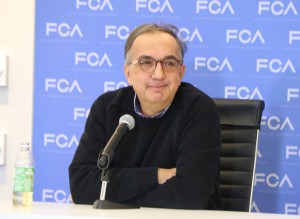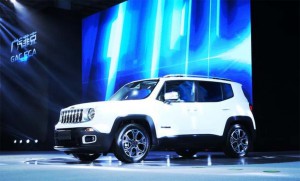
FCA CEO Sergio Marchionne reported the automaker made $539 million last quarter, but that the maker's debt level has risen.
Fiat Chrysler Automobiles posted better than expected earnings on Tuesday, largely as a result of strong pickup and SUV sales in North America. But rising debt has nervous investors quickly driving down the maker’s share price.
For his part, CEO Sergio Marchionne tried to buoy confidence in the trans-Atlantic automaker by forecasting an increase in production once temporary cutbacks at two U.S. plants are completed. Shifting capacity more towards the booming truck side of the market, Marchionne said he expects to see an increase in North American factory employment.
“I confirm now that the realigning of the footprint of NAFTA is going to yield an increase of manpower, subject to temporary layoffs,” Marchionne said during a conference call with analysts and reporters.
Registered in the Netherlands, with its corporate headquarters in London, FCA reported a net profit of 478 million euros, or $539 million, for the first quarter of 2016, up 27 million euros year-over-year. (The figure was adjusted to reflect the recent spin-off of the Ferrari sports car brand.)
Adjusted earnings before interest and taxes, or EBIT, doubled to 1.2 billion euros, or $1.36 billion. Revenues, meanwhile, surged 3%, to 26.5 billion euros, or $30.02 billion.
The EBIT improvement reflects a variety of factors, including reduced marketing, raw material and recall costs.
FCA also benefited from strong demand in the U.S. and Canadian markets for SUVs and pickups, though it continues to struggle to shore up sales for its once-powerful minivan franchise. Overall, sales of truck models grew 8% during the first quarter, to 634,000 vehicles.
Sales of the Jeep brand’s SUVs are just gaining momentum in the Chinese market. The maker opened its first SUV plant in China last autumn, a second factory is debuting this month.
(Jeep launches second plant in China. For more, Click Here.)
For his part, during an appearance at this week’s Beijing Auto Show, Marchionne forecast “significant double-digit growth” of the Chinese Jeeps in the months ahead. While the overall Chinese market has been slowing, sales of SUVs increased by more than 50% last year, a pace continuing through the first quarter of 2016.
That said, FCA continues to lag behind key rivals in China, the world’s largest automotive market. Ironically, Jeep was the first foreign brand to enter China three decades ago, but the old Beijing Jeep operation stayed with the German side of the company after the break-up of the ill-fated DaimlerChrysler AG nearly a decade ago.
After long struggling in Europe, a market just now emerging from a long recession, FCA reported earnings there quadrupled to 96 million euros. There, SUV sales also helped, demand exceeding expectations for the new Jeep Renegade model being produced in Italy. Sales of the new Fiat 500X – which shares platforms with the Renegade – and the Fiat Tipo also were strong.
Going forward, FCA officials told analysts they were bullish about the prospects for the Maserati brand just launching its first SUV. That model, the Levante, is soon expected to be the luxury brand’s best-seller. Questions, however, remain about plans for the Alfa Romeo brand.
(Click Here for details about why FCA is continuing to pursue possible mergers.)
Meanwhile, the maker’s Latin American operations also returned to the black.
The global success of the Jeep brand is helping offset other problems facing FCA in North America. It has been struggling with sluggish demand for its passenger cars and idled two Midwest plants, including one building the Chrysler 200 sedans in the Detroit suburb of Sterling Heights, Michigan.
Plans call for shifting production to more marketable, and higher profit, SUV models. In turn, Marchionne is expecting to see strong demand require an increase in the North American workforce.
The other big concern for analysts is FCA’s rising debt, an issue that saw investors sell off shares after the release of the earnings report.
(To see more about FCA laying off 1,300 employees at metro Detroit plant, Click Here.)
But Marchionne has maintained his position that FCA will be able to wipe out its industrial debt by 2018.


This is a little disturbing as they are focusing more on the short-term truck / SUV side which means they are ignoring the more-long term-profitable car side.